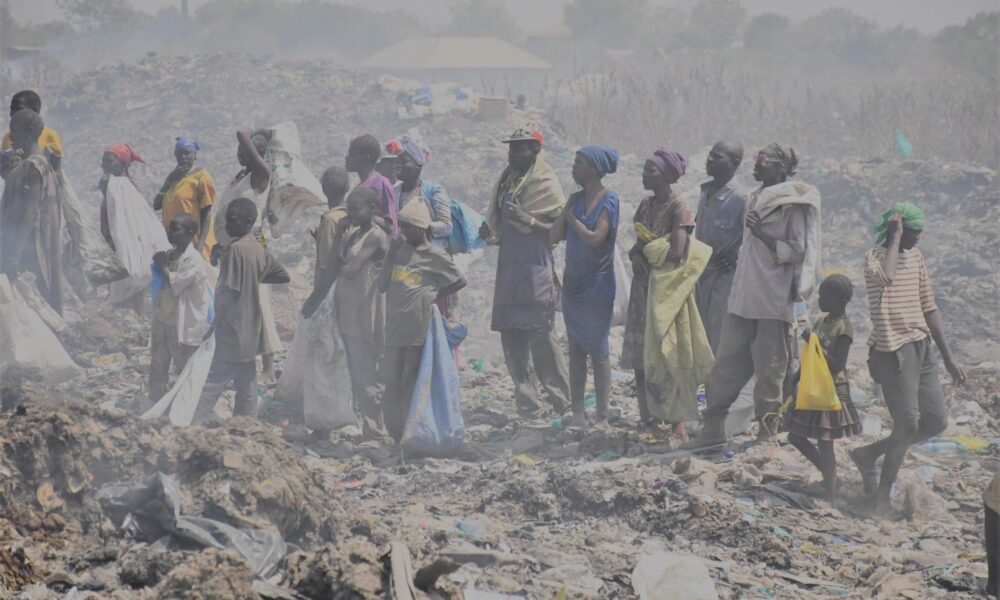By Bida Elly David
As South Sudan National Bureau of Standards (SSNBS) exerts efforts on consumer protection, some hungry citizens are surviving on the condemned food at the Jebel Korok dumping site.
Over the weekend, hunger-stricken-looking, Juba city residents, including men, women, and children, flocked the dumping site, rejoicing as a truck downloaded tons of expired commodities.
SSNBS had impounded over 5,000 assorted substandard, and expired goods that were set aflame on Saturday, before a crowd of sorrowful looking people, who had converged to scavenge of the garbage.
Misery struck the underprivileged citizens, who had no second thought of survival other than collecting expired goods to earn a living, yet by ill fate, were unable since the Bureau officials remained tucked at the site to avert intrusion.
Early this year, the chairperson of the South Sudan national bureau of standards promised to fight against substandard and expired goods for consumer protection, as these items are unfit to human health.
Commodities of interest for beneficiaries of the dumping site is not only to scavenge on consumable items but also non-consumables such bottles and metals.
Nancy Bashir, a 25-year-old mother of three children, disclosed to No. 1 Citizen Daily Newspaper, how she scavengers from the dumping site for survival.
According to Nancy, she always collects bottles from the garbage bins, cleans them, and sells them in a bid to buy food for her children.
“I know that some of these products are not healthy for myself and my kids; I mostly concentrate on collecting the plastic bottles and selling them to women selling local breweries and juice in the area and in town,” she said.
Nancy stated that Jebel Market, Custom Market, and Rock City are her key commercial areas.
The lady demonstrated pity for her military husband, who struggles for food but mostly comes home without a bag of bread for the children.
“My husband is not a bad husband, only that the country’s situation does not favour our ability to live as citizens of this country,” she decried.
Furthermore, Nancy underscored that she is currently educating three of her children from the business she runs through the products gathered from the dumping site.
She testified that the majority of residents in those areas were jubilant after seeing trucks accelerating with products for dumping.
“When we see these trucks coming, it is like UNHCR bringing food to refugees; although they are burned, we have to struggle to make sure they set off the fire to get some of these goods for our consumption,” she expressed.
“The security has always been rough against us, but we always wait when the team takes off and rushes in a good number to struggle,’’ she added.
She noted that they have always been cautious of children moving closer to the fire, saying they are always advised to be home.
Paul Raymondo Musa, Nancy’s husband, accepted the fact that they feed on the expired goods.
“No need to hide; I and our children mostly feed on and depend on these expired goods once they are brought by the dumping team,” he said.
“Eating the expired biscuits, drinking the soda and juice, as well as the flour, is far better than leaving to die and stealing people’s property,” Raymondo exclaimed.
He said they won’t desist from feeding on the goods as long as they don’t die of hunger and send their kids to school.
The national bureau of standards fought and is struggling very hard to ensure the safety of the residents at the dumping site, but the residents still force themselves due to hunger.
Meanwhile, Gloria N. Joseph, the acting director for technical operations, feels pity for the residents living around the dumping site, saying they need to be educated on the dangers of the expired products.
“We are concerned about the safety, environment, and health of these people at the dump in this area. So, when we work, we don’t work alone,” she stated. “As the National Bureau of Standards, we work together with the local government. So, I think it is one of the concerns of the National Bureau of Standards.”
“We can also raise this concern with the other stakeholders to discuss how we can really keep those people who are around safe or how we can really have a means of making sure that they don’t have access to this place,” she continued.
She said the condemned goods are poisonous for the health of the citizens living within the circumference of the site.
“Another thing is for us to raise awareness; yes, they are looking for something, but again, they don’t know that it is a risk to their health. This is one of the things that I think we can do, and we have been raising it in some of our meetings with the stakeholders so that we can see what is next.
Kuorwel Kuai Kuorwel, the chairperson of the standard bureau, noted that it is their role to ensure the protection of consumers against fake goods across the country.
The SSNBS boss stated that they would not hesitate to rescue the people from eating the expired products, particularly at the dump.
He said they have always been so careful, especially when dropping impounded expired goods at the dumping site.
“We normally coordinate with our security forces when taking the expired goods to the dumping site for their health and safety,” he said.
Mr. Kuorwel underscored that they will still carry a comprehensive civil awareness in regards to the impact of expired goods on human health.
Last year, over 200 hungry citizens also gathered at the same site in a bid to collect the similar expired goods to survive the biting hunger.




